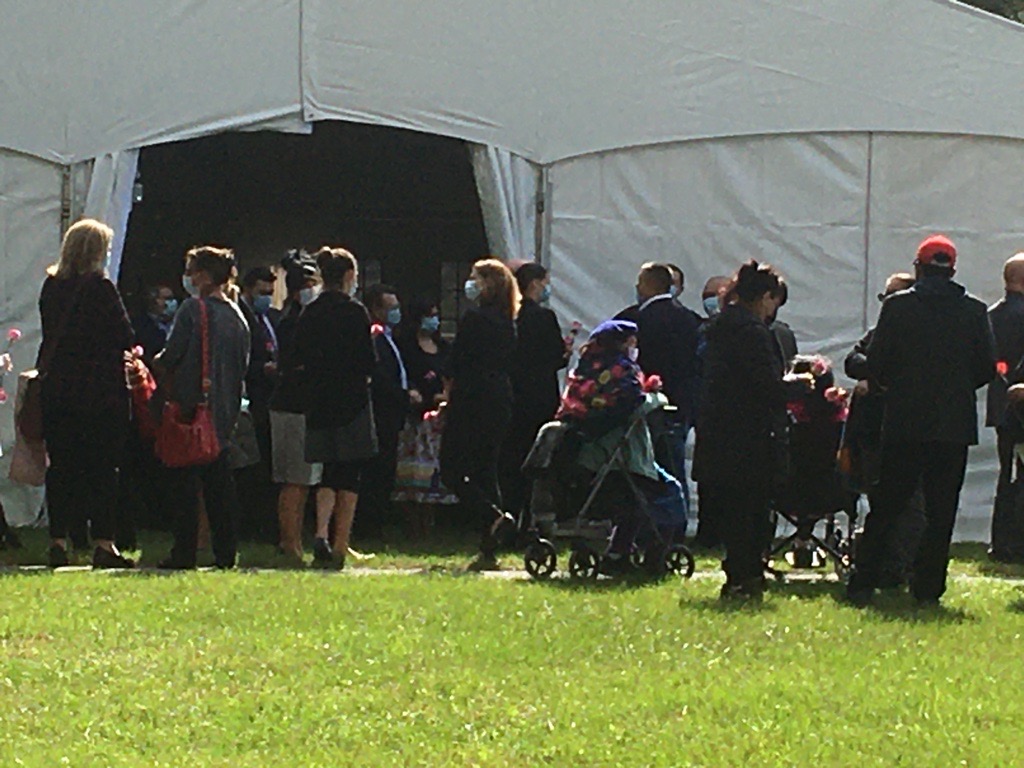One year after Joyce Echaquan was mocked by staff as she lay dying in hospital, her family and community members called on Quebecers to honour her legacy by acknowledging systemic racism in health care and throughout society.

Echaquan, a 37-year-old Atikamekw mother of seven, filmed herself on Facebook Live as a nurse and an orderly were heard making derogatory comments toward her at a hospital in Joliette, Que., northeast of Montreal, before she died on Sept. 28, 2020.
On Tuesday, Echaquan’s family visited the hospital room where she died and later took part in a ceremony in her honour with Atikamekw community members, politicians and other guests. Some guests carried a red or pink rose as they entered a white tent erected behind the hospital. Others, some wearing ribbon skirts or sweatshirts bearing Echaquan’s picture, sat on folding chairs outside.
After the ceremony, her husband, Carol Dubé, spoke through tears as he described how her death had upended the family. He said she didn’t deserve the “denigration” she suffered at the hands of hospital staff at the end of her life. But he expressed hope that his partner’s death would help to build a better society.
“We have to give a meaning to this tragic event. Ignorance must cede its place to reconciliation,” he said.
“I remain, despite everything, filled with hope, because I’ve seen people stand up, voices rise up, against racism and discrimination.”
Echaquan’s death sparked outrage across the province, and it led to calls for more action to tackle the discrimination that Indigenous people — Indigenous women in particular — face when trying to access government services.
Some of those present at the ceremony acknowledged that certain changes have occurred, including the hiring of more Indigenous staff within the province’s health network. Several speakers, however, called out the Quebec government for refusing to recognize the existence of systemic racism — something Premier François Legault has consistently refused to do.

Get daily National news
Paul-Emile Ottawa, chief of Echaquan’s community of Manawan, located about 150 kilometres north of Montreal, said the Quebec government has a “duty” to acknowledge systemic racism and its failure to do so “represents a great pain and adds greatly to the pain experienced by Joyce’s family and loved ones.”
Constant Awashish, chief of the Atikamekw First Nation, told reporters he appreciates that Quebecers are more aware of systemic racism since Echaquan’s death.
He urged the government to adopt Joyce’s Principle, which is a series of measures drafted by the Atikamekw community to ensure equitable access to health care for Indigenous patients. The document describes Quebec’s health system as being imbued with systemic racism.
“It’s a confusing day for people,” Awashish said. “We want something better for future generations and better treatment for First Nations in public services, but also there is this anxiety that Joyce Echaquan gave her life for no reason.
“The feeling of anxiety is that we want the government to recognize the situation and call it by its real name,” he added.

Indigenous Affairs Minister Ian Lafrenière attended the ceremony alongside Public Safety Minister Geneviève Guilbault. Both made brief statements highlighting the importance of the anniversary but did not answer questions.
Legault tweeted on Tuesday that what had happened to Echaquan was a “collective awakening to the discrimination still suffered by Indigenous Peoples.” He added: “Let’s continue to fight against these behaviours that have no place in our society.”
Manawan has announced plans to name a biodiversity reserve at Lac-Nemiscachingue in Echaquan’s honour. The government has said it intends to begin that renaming process.
Under blue skies in Joliette, members of Echaquan’s community said Tuesday’s ceremony was another small step in a long healing process. Alice Echaquan, Joyce Echaquan’s cousin, described her relative as “a wonderful woman” who loved her family, especially her children.
“All the time, she was happy,” she said. “Even if she had problems, she had a smile all the time.”
Another woman from Manawan, Marie-Edith Fontaine, urged Quebecers to use the anniversary as an opportunity to educate themselves about Indigenous people, adding that recognizing the existence of systemic racism would be a good first step.
“Right now, I don’t think there’s any reconciliation between Indigenous people and non-Indigenous people, and I think it would be a good step forward.” She said it would take time for the community to heal from the loss of Echaquan, whom she described as “the most amazing person,” who had a smile on her face no matter what.
“When I think about Joyce, I think about joy. That’s who she was,” Fontaine said.
A vigil, organized by a coalition of health-care workers, was also held Tuesday evening in Montreal.
A few hundred people gathered at Place Emilie-Gamelin to remember Echaquan, and echo the calls of her community for the Quebec government to implement Joyce’s Principle.
“There have been a number of inquiries, a number of commissions and over and over the same message is repeated, the same truth is revealed and I think it’s a sort of denial of the truth from the government’s perspective,” said Glenda Sandy, a Naskapi-Cree Nurse who attended the vigil.
Organizers said they would like to see systemic racism recognized and that acknowledging the problem is an essential step.
— With files from Global News’ Gloria Henriquez
Family and loved ones pay tribute to Joyce Echaquan, who died one year ago.








Comments
Comments closed.
Due to the sensitive and/or legal subject matter of some of the content on globalnews.ca, we reserve the ability to disable comments from time to time.
Please see our Commenting Policy for more.